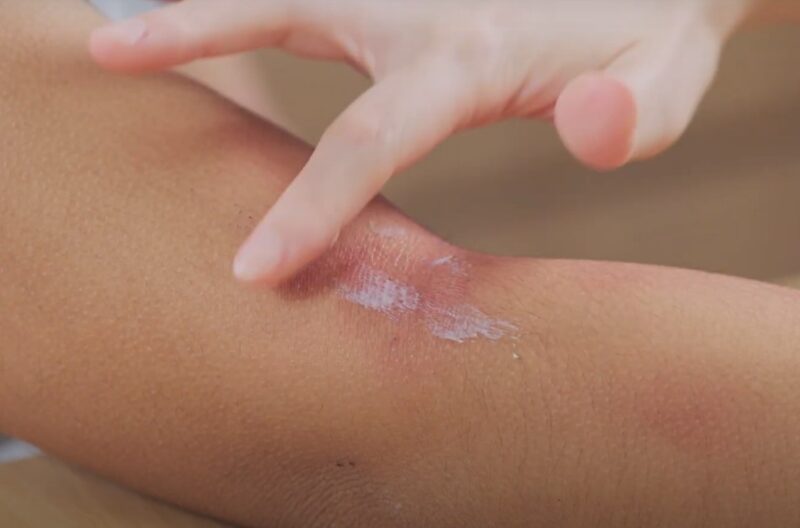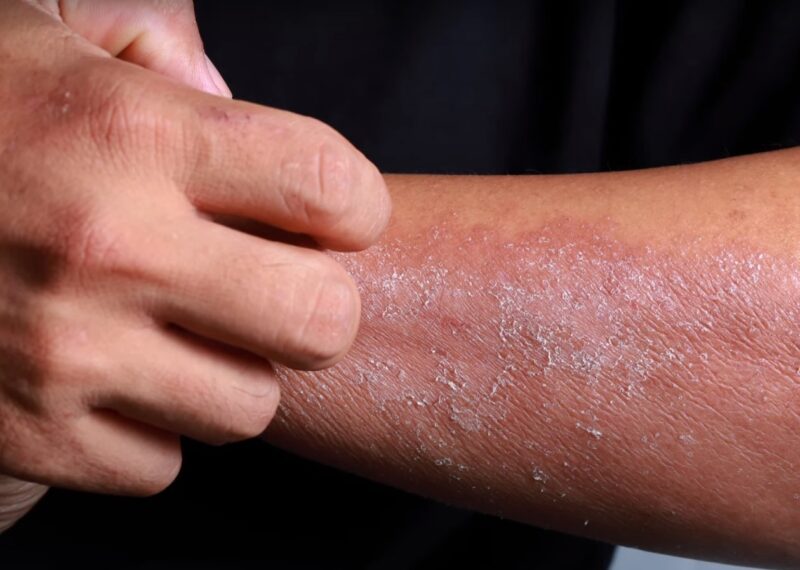Eczema and stress are like two sides of the same coin in the health world. Eczema is a skin condition that makes your skin red, itchy and inflamed.
Stress, on the other hand, is what you feel when you’re under a lot of pressure, and it can make you feel worried or anxious. These two can feed off each other: stress can make eczema worse, and dealing with eczema can make you stressed.
Over 31 million Americans have eczema, which shows up in different ways, like really dry skin or red patches. And stress?
Well, everyone feels it at some point. This article looks into how they’re connected, why it matters, and what we can do about it.
Key Takeaways
How Stress Can Trigger or Worsen Eczema Symptoms?
When you’re stressed, your body releases hormones like cortisol. This can mess with your immune system and the outer layer of your skin, making eczema flare up.
Research has shown that these hormones can make inflammation worse and break down the skin barrier that keeps moisture in and germs out.
What Sets It Off
Stressors for people with eczema can be anything from work pressure to personal issues. These stressors can start a cycle of stress and itching.
When you itch, you scratch, which makes the skin worse, leading to more stress.
The Vicious Cycle
This cycle of stress, itching, and sleeping poorly can also affect your mood, making you feel more anxious or depressed. It’s a tough loop to break out of because each part makes the other parts worse.
How Eczema Can Trigger or Worsen Stress Symptoms?

Living with eczema isn’t just about dealing with skin issues. It can make you feel bad about yourself, avoid social situations, or worry about flare-ups, adding a lot of stress to your life.
Challenges Faced
People with eczema often deal with not just the physical symptoms but also the emotional ones, like feeling embarrassed or having low self-esteem. This emotional toll can lead to more stress, which, in turn, can make eczema worse.
When It Gets More Complicated
Having eczema can also mean you’re more likely to have other health issues like anxiety or depression. These problems can make managing eczema even harder.
How Psychological Therapy Can Help?

Combining psychological therapy with regular eczema treatments can help. Studies show that therapies like CBT (cognitive-behavioral therapy) can reduce stress and improve eczema symptoms.
Types of Therapy
Besides CBT, mindfulness and acceptance therapy can teach people with eczema how to deal with stress in a healthy way, which can help them manage their skin condition better.
Facing the Challenges
While therapy can help a lot, it’s not always easy to get started. Finding the right therapist and sticking with therapy can be tough, but it’s worth it for many people.
How Stress Reduction Strategies Can Improve Symptoms?
Managing stress through lifestyle changes and relaxation techniques can help control eczema. Things like eating well, getting enough sleep, and doing exercises like yoga can make a big difference.
Simple Changes, Big Effects
Even small adjustments in how you handle stress can help. This includes setting aside time to relax, practicing deep breathing, and finding positive ways to connect with others.
Making It Work for You
Everyone’s different, so it’s important to find stress reduction techniques that fit your life and preferences. This might mean trying out a few different strategies to see what helps you the most.
How to Build Resilience Against Eczema and Stress?

Resilience means being able to bounce back from tough times. For people with eczema, this can mean finding ways to handle flare-ups and stress without getting overwhelmed.
Research Shows
Studies suggest that people who work on being more resilient can handle the ups and downs of eczema better. This includes learning to accept what’s happening, seeking support, and focusing on what you can control.
Strategies That Help
Building resilience can involve setting realistic goals, staying flexible, practicing self-kindness, and looking for the silver lining in tough situations. These strategies can help both kids and adults with eczema.
What are the Limits of Therapy and Stress Reduction?
While therapy and stress reduction strategies offer great benefits, they aren’t magic cures. For some people, these approaches can make a big difference in managing eczema and stress.
But for others, the results might not be as noticeable. Everyone’s situation is unique, and what works well for one person might not work for someone else.
Varying Results
It’s important to remember that therapy and stress management techniques require time and effort. Sometimes, even with the best intentions, these methods may not provide the relief expected.
This doesn’t mean they’ve failed but rather that finding the right combination of treatments and strategies can take time and might need adjustments along the way.
Keeping Expectations Realistic
Setting realistic expectations is key. Therapy and stress reduction can help manage symptoms and improve quality of life, but they may not eliminate eczema or stress.
Being patient and open to trying different approaches is part of the journey toward better health.
What are the Alternative and Complementary Therapies?

Beyond the realm of traditional therapy, there’s a world of alternative and complementary therapies that might offer relief. Treatments like acupuncture, meditation, and massage have been used for stress management and could potentially help with eczema symptoms.
While scientific research into their effectiveness specifically for eczema is ongoing, many find these practices beneficial for overall well-being.
Personal Experiences and Research
Anecdotal evidence suggests that some people with eczema see improvements in their skin condition and stress levels after incorporating these therapies into their routine. However, it’s important to approach these options with an open mind and a bit of caution, as more research is needed to fully understand their impact.
Incorporating New Practices
If you’re considering alternative therapies, it’s a good idea to talk with a healthcare provider first. They can offer guidance on which options might be most effective for you and ensure they complement your current treatment plan safely.
The Power of Community and Support

Dealing with eczema and stress can feel lonely, but finding a community of people who understand what you’re going through can make a big difference. Support groups, whether online or in person, offer a space to share experiences, exchange tips, and find emotional support.
Sharing and Learning Together
In these communities, members often share what’s worked for them, which can provide new ideas for managing eczema and stress. Learning from others’ experiences can be incredibly valuable and can introduce you to strategies you might not have considered before.
Building Resilience Together
Beyond just sharing advice, support communities can play a crucial role in building resilience. Knowing you’re not alone, feeling understood, and having a network of support can bolster your ability to cope with challenges.
Together, members can encourage each other to stay positive and keep trying new ways to manage their condition, making the journey a bit easier for everyone involved.
FAQ
Can diet changes reduce stress-induced eczema flare-ups?
Dietary changes can indirectly help manage stress-induced eczema by improving skin health and reducing inflammation, through a balanced diet rich in anti-inflammatory foods like fruits, vegetables, whole grains, and omega-3 fatty acids.
Does exercise impact eczema severity during stress?
Regular physical activity can reduce stress levels, improve mood, and boost immune function, potentially mitigating stress’s impact on eczema. Choosing eczema-friendly activities, such as low-impact exercises or swimming in saltwater pools, is advised.
How is sleep quality linked to stress and eczema?
Poor sleep quality can worsen both stress and eczema symptoms, as it increases cortisol production. Conversely, improving sleep hygiene and managing stress can help reduce eczema flare-ups, creating a beneficial cycle of stress reduction and better skin health.
Can mindfulness meditation directly improve eczema symptoms?
Mindfulness meditation can directly positively impact eczema by reducing stress levels, decreasing the body’s inflammatory response, and improving the skin barrier function, leading to potentially fewer or less severe flare-ups.
Are certain types of psychological stress more likely to trigger eczema?
Both acute (like sudden life changes) and chronic stress (such as ongoing work stress or personal challenges) can exacerbate eczema symptoms. The impact varies among individuals, highlighting the need for personalized stress management strategies.
Does being in natural environments affect stress-related eczema?
Spending time in natural environments or green spaces can lower stress and might improve eczema symptoms by reducing cortisol levels, enhancing mood, and supporting immune function. Integrating outdoor activities into one’s routine can be a beneficial part of eczema and stress management.
Final Words
Eczema and stress are closely linked, and understanding this relationship can help us manage both better. From scientific research to personal stories, it’s clear that dealing with stress can improve eczema symptoms and make life a bit easier for those affected.
Psychological therapies, lifestyle changes, and building resilience are all important pieces of the puzzle. As we learn more, it’s crucial to keep sharing what works and supporting each other in managing both eczema and stress.
Some home remedies, such as using a hydrating cleanser, applying apple cider vinegar, or exfoliating gently, may also help reduce acne for dry skin types. However, it’s important to consult a dermatologist before trying any new treatments, especially if you have severe or persistent acne.

